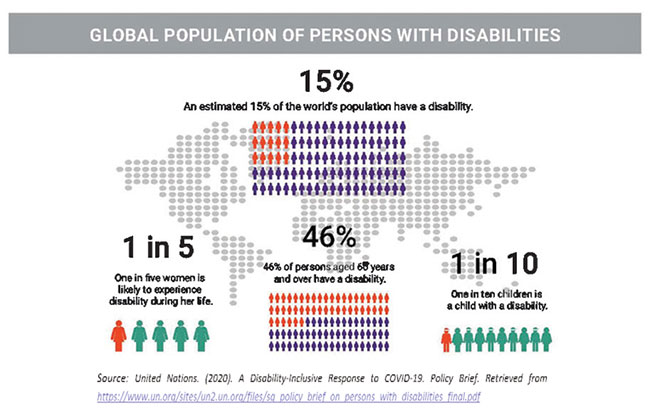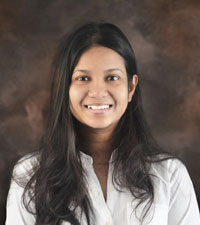Business
Leave No One Behind: Building a disability-inclusive COVID-19 recovery plan for Sri Lanka

By Lakshila Wanigasinghe
Persons with disabilities (PWDs) are an important group that needs to be considered when building an all-inclusive COVID-19 recovery plan. They often tend to get excluded or only partly considered due to the heterogeneous nature of the difficulties they face owing to the diversity in the types of disabilities and support required. This blog explores the significant challenges faced by PWDs amidst COVID-19 and outlines strategies that Sri Lanka can adopt towards ensuring an inclusive recovery.
PWDs and Emerging Challenges
Over 1 billion people around the world live with some form of disability, accounting for 15% of the world population as shown in Figure 1. Around 80% of PWDs live in developing countries including 1,617,924 persons in Sri Lanka (as of 2012). Hardships faced by such persons are greater for those living in developing countries due to limited resources and facilities available to them. Many developing countries lack resources to detect disability early on, have inadequate rehabilitation facilities, and lag in updated research and strategies to support PWDs. This is the case in Sri Lanka where PWDs have inadequate access to society, education, specialised healthcare, and employment opportunities in comparison to developed countries.
 Adversities faced by PWDs have escalated due to COVID-19. A study conducted by Global Disability Inclusion found that apart from heightened health risks, the pandemic significantly affected the employment and financial security of PWDs. This can widen existing disparities and lead to long-term consequences such as higher poverty rates, lower wages and increased costs of living among such persons, thereby leaving lasting impacts on their lives.
Adversities faced by PWDs have escalated due to COVID-19. A study conducted by Global Disability Inclusion found that apart from heightened health risks, the pandemic significantly affected the employment and financial security of PWDs. This can widen existing disparities and lead to long-term consequences such as higher poverty rates, lower wages and increased costs of living among such persons, thereby leaving lasting impacts on their lives.
While COVID-19 has affected the global population, its effects are distinct and intensified for PWDs. Their pre-existing health conditions put them at greater risk of contracting the virus, experiencing severe symptoms and higher mortality rates. Depending on the nature of their disability, some individuals are unable to effectively communicate their symptoms or practice preventative measures such as regular sanitisation.
Lack of access to public health information due to physical, mental or sensory impairments poses a higher risk of PWDs contracting COVID-19 by being unaware of symptoms and precautionary measures that need to be taken. Disproportionate access to information also poses a threat when implementing recovery procedures.
Lockdowns and social distancing policies limit access to caretakers and medical professionals, putting those unable to care for themselves at substantial risk while in isolation. Lockdowns can also prevent PWDs from accessing basic necessities and seeking regular medical care. Further, school closures and the switch to distance education have led to higher learning disruptions among children with disabilities. This is more pronounced for children in developing countries due to factors such disproportionate access to technology, and lack of assistive devices and in-person support.
Overcoming the Challenges
An understanding of the barriers faced by PWDs is essential to ensure an inclusive recovery. Therefore, it is vital to consult PWDs and engage organisations that work with these groups –such as the Department of Social Services and the National Secretariat for Persons with Disabilities (NSPD) – throughout the decision-making process of creating a disability-inclusive recovery plan. Information about the disease such as ways of contraction, symptoms, precautionary measures and procedure to follow in the event of contracting it should be made readily available in accessible formats. This includes presenting COVID-19 related information in sign language, captions, braille, graphics, etc.
It is important for PWDs to be prioritised during the vaccination process. If active efforts are not made to include these groups, they will be disproportionately excluded, and will be among the last to receive vaccinations. The healthcare systems should identify PWDs that meet the eligible vaccination criteria and provide them information on vaccination.
However, this requires proper procedures to be in place for these individuals to register for vaccinations, along with disability-accessible vaccination centres and regular monitoring of such persons upon completion of the vaccination process. The NSPD and other local organisations that work with these groups can be utilised to make the process more accessible and effective. Further, special vaccination drives solely targeting PWDs are an option to ensure effective and efficient vaccination.
In addition, social protection systems should be enhanced to support PWDs better, especially those adversely impacted by COVID-19. A commendable initiative by the government was the extension of its COVID-19 relief cash transfers beyond regular recipients (PWDs in low-income households) to those in the waiting list and groups specially identified by rural committees. However, to ensure long-term recovery and prevent low-income groups from slipping into poverty, these groups should be evaluated by the NSPD and absorbed into the existing social protection system.
Road to Recovery
COVID-19 has exposed many weaknesses in healthcare, education and social protection systems worldwide, such as high levels of inequalities and the lack of inclusivity. To ensure sustainable post-COVID recovery, resources should be strategically allocated to support all groups of people and inclusion must be made a priority to build a lasting recovery plan.
In the long-term attention should be directed at building more inclusive systems that are better equipped at serving all groups of people and are more resilient to shocks in the future. A starting point for Sri Lanka would be to increase disability-accessible infrastructure (in public buildings, public transport, restrooms etc.), provide better healthcare and rehabilitation facilities, actively engage PWDs in the workforce, reduce stigma surrounding disability, and increase engagement between PWDs and society at large.
Link to original blog: https://www.ips.lk/talkingeconomics/2021/08/16/leave-no-one-behind-building-a-disability-inclusive-covid-19-recovery-plan-for-sri-lanka/
Lakshila Wanigasinghe is a Research Assistant at IPS with research interests in poverty, social welfare, development, education, and health. She holds an MSc in Economics with a concentration in Development Economics and a BA in Economics with concentrations in International, Financial and Law and Economics from Southern Illinois University Carbondale (SIUC), US. (Talk with Lakshila – lakshila@ips.lk).
Business
AHK Sri Lanka champions first-ever Sri Lankan delegation at Drupa 2024

The Delegation of German Industry and Commerce in Sri Lanka (AHK Sri Lanka) proudly facilitated the first-ever Sri Lankan delegation’s participation at Drupa 2024, the world’s largest trade fair for the printing industry and technology. Held after an eight-year hiatus, Drupa 2024 was a landmark event, marking significant advancements and opportunities in the global printing industry.
AHK Sri Lanka played a pivotal role in organising and supporting the delegation, which comprised 17 members from the Sri Lanka Association for Printers (SLAP), representing eight companies from the commercial, newspaper, stationery printing, and packaging industries. This pioneering effort by AHK Sri Lanka not only showcased the diverse capabilities of Sri Lanka’s printing sector but also facilitated vital bilateral discussions with key stakeholders from the German printing industry.
Business
Unveiling Ayugiri: Browns Hotels & Resorts sets the stage for a new era in luxury Ayurveda Wellness

In a captivating reimagining of luxury wellness tourism, Browns Hotels & Resorts proudly unveiled the exquisite Ayugiri Ayurveda Wellness Resort Sigiriya. This momentous occasion, celebrated amidst a vibrant and serene grand opening on the 6th of June, heralds a new chapter in the Ayurveda wellness tourism landscape in Sri Lanka. Nestled amidst 54 acres of unspoiled natural splendour, Ayugiri features 22 exclusive suites and stands out as the only luxury Ayurveda wellness resort in the country offering plunge pools in every room, rendering it truly one-of-a-kind.
The grand opening of Ayugiri Ayurveda Wellness Resort was an enchanting event, where guests were captivated by the melodies of flutists and violinists resonating through Sigiriya’s lush landscapes. As traditional drummers and dancers infused the air with vibrant energy, Browns Hotels & Resorts’ CEO, Eksath Wijeratne, Kotaro Katsuki, Acting Ambassador for the Embassy of Japan and General Manager, Buwaneka Bandara, unveiled the resort’s new logo, marking a significant moment witnessed by distinguished guests from the French Embassy, Ayurveda and wellness enthusiasts along with officials from the Sigiriya area, LOLC Holdings and Browns Group.
“Our strategic expansion into wellness tourism with Ayugiri Ayurveda Wellness Resort Sigiriya symbolises a significant milestone for Browns Hotels & Resorts. Wellness tourism has consistently outperformed the overall tourism industry for over a decade, reflecting a growing global interest in travel that goes beyond leisure to offer rejuvenation and holistic well-being. By integrating the timeless wisdom of Ayurveda with modern luxury, we aim to set a new standard in luxury wellness tourism in Sri Lanka. Whether your goal is prevention, healing, or a deeper connection to inner harmony, Ayugiri offers a sanctuary for holistic well-being” stated Eksath Wijeratne.
Ayugiri encapsulates the essence of life, inspired by the lotus flower held by the graceful queens of the infamous Sigiriya frescoes. Just as the lotus emerges from the murky depths, untainted and serene,
Ayugiri invites guests on a journey of purity and rejuvenation, harmonised with a balance of mind, body and spirit, the essence of nature, echoes of culture and the wisdom of ancient Ayurvedic healing.
Business
HNB General Insurance recognized as Best General Bancassurance Provider in Sri Lanka 2024

HNB General Insurance, one of Sri Lanka’s leading general insurance providers, has been honored as the Best General Bancassurance Provider in Sri Lanka 2024 by the prestigious Global Banking and Finance Review – UK.
The esteemed accolade underscores HNB General Insurance’s unwavering commitment to excellence and its outstanding performance in the field of bancassurance. Through dedication and hard work, the HNB General Insurance team has continuously endeavored to deliver innovative insurance solutions, cultivate strong relationships with banking partners, and provide unparalleled service to customers nationwide. This recognition is a testament to the team’s dedication and relentless pursuit of excellence in the bancassurance business.
“We are honored to receive this prestigious award, which reflects our team’s tireless efforts and dedication to delivering value-added insurance solutions and exceptional service through our bancassurance partnerships,” said Sithumina Jayasundara, CEO of HNB General Insurance. “This recognition reaffirms our position as a trusted insurance provider in Sri Lanka and motivates us to continue striving for excellence in serving our customers and communities.”












